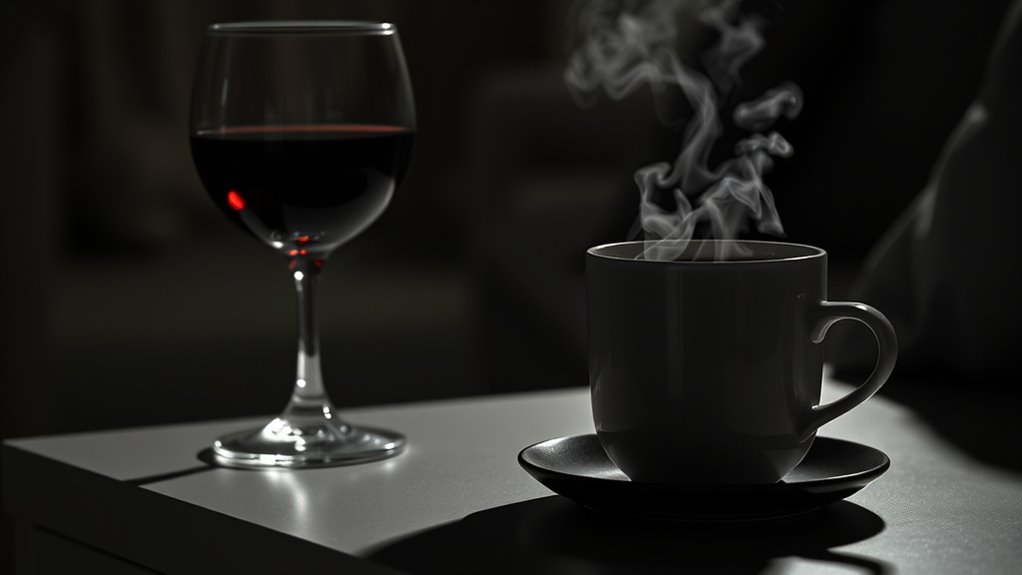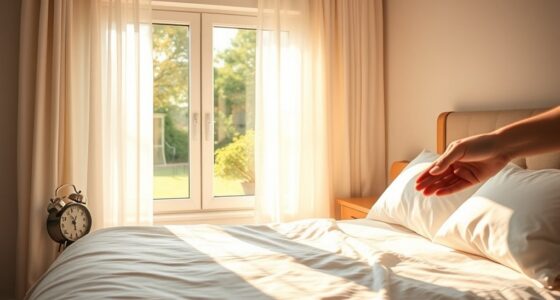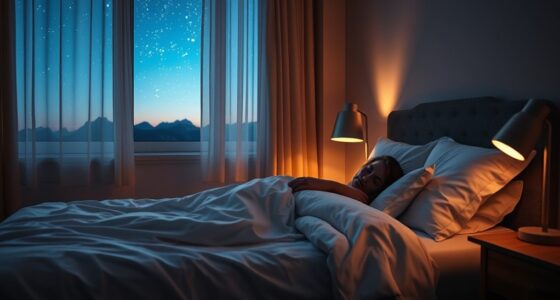Alcohol and caffeine both disrupt your sleep in different ways. Alcohol initially makes you drowsy but fragments your sleep and reduces REM cycles, leaving you less rested. Caffeine, a stimulant, blocks sleep signals and can delay your sleep onset, especially if you drink it late. Your sleep quality suffers overall, and long-term use can lead to dependency. If you continue exploring, you’ll discover tips to minimize these effects and improve your rest.
Key Takeaways
- Alcohol reduces REM sleep and fragments sleep stages, leading to lighter, less restorative sleep.
- Caffeine blocks adenosine, delaying sleep onset and decreasing overall sleep quality.
- Late-day caffeine and alcohol consumption disrupt sleep patterns, causing difficulty falling asleep and early awakenings.
- Regular use of alcohol and caffeine can impair sleep architecture and contribute to long-term sleep problems.
- Proper timing and moderation of intake, along with relaxation techniques, can minimize sleep disruptions.
The Effects of Alcohol on Sleep Patterns
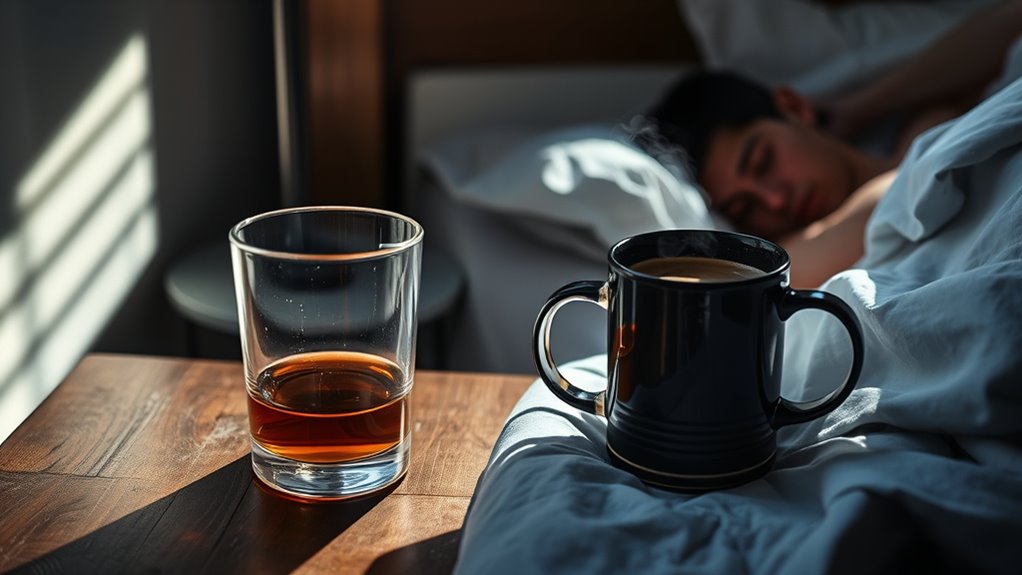
Alcohol may initially make you feel sleepy, but it actually disrupts your sleep cycle. When you consume alcohol, your body begins alcohol metabolism, breaking it down in the liver. This process affects your sleep architecture by reducing REM sleep and fragmenting your sleep stages. As alcohol is processed, it causes early awakenings and lighter sleep, making you feel less rested. Even small amounts can interfere with the natural progression of sleep cycles, leading to a less restorative rest. Additionally, alcohol’s impact on sleep can be influenced by contrast ratio, which affects how well your brain processes sleep signals and maintains sleep continuity. While alcohol might seem to help you fall asleep faster, its impact on sleep architecture results in poor sleep quality overall. This disruption can leave you feeling tired and groggy the next day, highlighting how alcohol’s effects extend beyond initial drowsiness.
How Caffeine Stimulates Wakefulness and Disrupts Rest
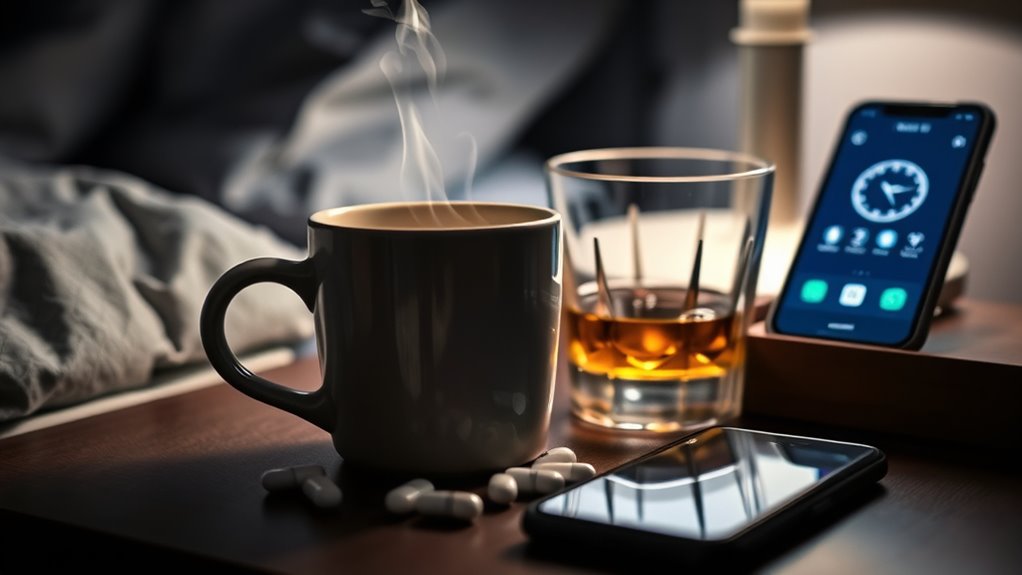
Caffeine acts as a powerful stimulant that keeps you alert and awake by blocking the effects of adenosine, a brain chemical that promotes sleep. Once you consume caffeine, your body begins metabolizing it through caffeine metabolism, which varies based on factors like age, genetics, and liver health. During this process, caffeine’s alertness enhancement effects peak, making you feel more awake and focused. However, this increased alertness can disrupt your natural sleep cycle, especially if consumed later in the day. Caffeine’s ability to delay sleep onset, reduce total sleep time, and decrease sleep quality stems from its interference with your body’s normal rest signals. Understanding how caffeine stimulates wakefulness helps you make informed choices about its consumption and its impact on your sleep. caffeine metabolism varies among individuals, influencing how long its stimulating effects last and how significantly it can disrupt sleep.
The Timing of Consumption and Its Impact on Sleep Quality
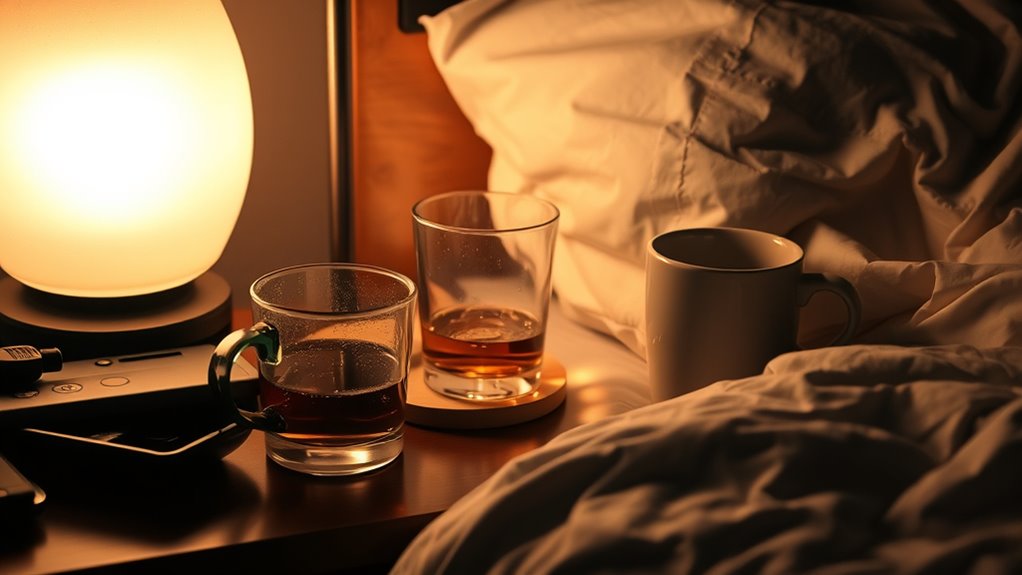
The timing of when you consume alcohol or caffeine considerably influences your sleep quality. Your consumption patterns directly impact how quickly you fall asleep and how restful your sleep is. Drinking caffeine late in the day can delay sleep onset, while alcohol consumed too close to bedtime may disrupt sleep cycles. Consider these timing considerations:
| Early Day | Late Night |
|---|---|
| Minimal impact | Significant disruption |
| Better alertness | Fragmented sleep |
| Easier to fall asleep | Reduced REM sleep |
Adjusting your consumption patterns helps optimize sleep quality. Avoid caffeine after mid-afternoon and limit alcohol intake several hours before bed. Being mindful of timing can make a noticeable difference in how refreshed you feel in the morning. For example, understanding the different headphone jacks and their compatibility can help you choose the right device for better relaxation and sleep improvement.
Long-Term Consequences of Using Alcohol and Caffeine for Sleep Management
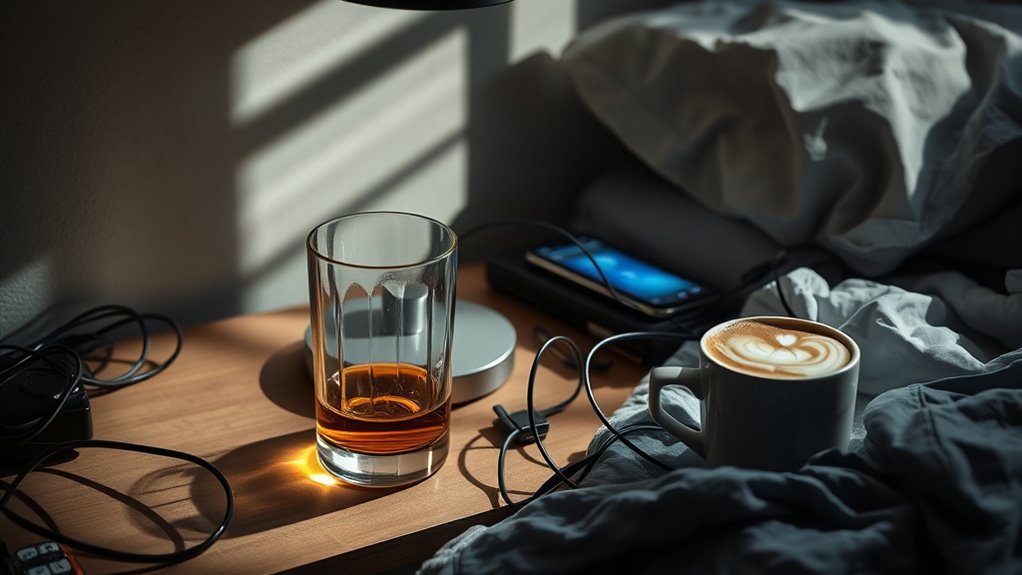
While turning to alcohol or caffeine as a quick fix for sleep problems might seem helpful in the short term, long-term use can seriously harm your health. Relying on these substances regularly can reduce your sleep quality, leading to fragmented, less restorative sleep over time. Alcohol may initially make you feel sleepy, but it disrupts REM sleep, impairing your rest. Caffeine, especially when consumed late, can create a cycle of poor sleep and daytime fatigue. Additionally, dependency risks increase with prolonged use, making it harder to fall asleep naturally without these substances. Over time, this dependency can lead to a harmful cycle that worsens sleep issues rather than solving them, impacting your overall health and well-being. Understanding the effects of toilet flushing mechanisms can help you make healthier choices for your body and environment.
Tips for Minimizing Sleep Disruptions From Alcohol and Caffeine
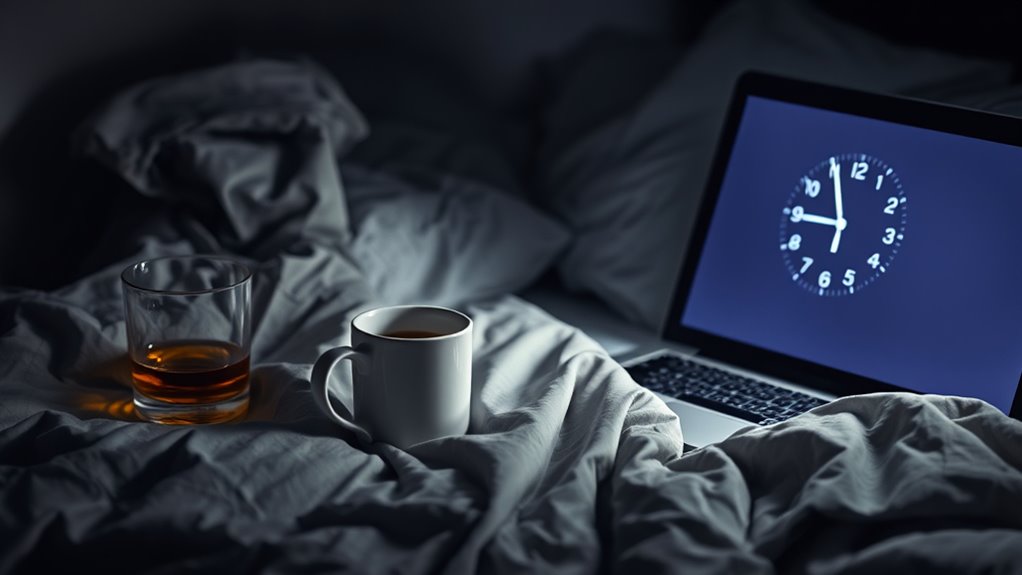
To reduce sleep disruptions caused by alcohol and caffeine, it’s important to adopt mindful consumption habits. Limit caffeine intake to the morning or early afternoon, so it doesn’t interfere with your sleep cycle. Avoid drinking alcohol close to bedtime, as it can disrupt your sleep hygiene even if it initially makes you sleepy. Incorporate relaxation techniques, such as deep breathing or meditation, to help your body wind down naturally. Establish a consistent sleep schedule to reinforce your body’s internal clock. Create a calming bedtime routine free of screens and stimulants, promoting better sleep quality. Staying mindful of what you consume and practicing relaxation techniques can considerably minimize sleep disruptions and improve your overall sleep health. Additionally, understanding Gold IRA Rollovers can help you plan your retirement savings more securely, ensuring peace of mind for your future.
Frequently Asked Questions
Can Moderate Alcohol or Caffeine Intake Still Significantly Affect Sleep Quality?
You might wonder if moderate alcohol or caffeine intake still affects sleep. Even in small amounts, alcohol metabolism can disrupt your sleep cycle, leading to fragmented rest. Caffeine sensitivity varies, so even moderate amounts can interfere with your ability to fall asleep or stay asleep. Being mindful of your body’s response helps, but moderation doesn’t guarantee a full night’s rest if you’re sensitive or have a slower alcohol metabolism.
Are There Specific Types of Alcohol or Caffeine That Are Less Disruptive to Sleep?
Are there alcohol types or caffeine varieties that disturb sleep less? You might find that lighter alcohol types, like wine or light beer, cause less disruption than spirits or dark liquors. For caffeine, moderate coffee or green tea may be gentler than energy drinks or strong espresso. Choosing these options and consuming them earlier in the day helps minimize sleep disturbances, so you can enjoy better rest.
How Do Individual Differences Influence Alcohol and Caffeine’S Effects on Sleep?
Individual differences, like genetic variability and lifestyle factors, shape how alcohol and caffeine affect your sleep. Your genetic makeup influences how quickly your body processes these substances, making some more sensitive than others. Lifestyle choices, such as stress levels, sleep habits, and overall health, also play a role. Recognizing these factors helps you understand why alcohol or caffeine may disturb your sleep differently than someone else, allowing you to make personalized adjustments.
Can Consuming Alcohol or Caffeine Improve Sleep for Certain People?
Imagine your sleep as a delicate garden. Alcohol relaxation might help some people settle in, like a gentle rain calming plants, while caffeine alertness can act like a bright sun, energizing others. For certain individuals, a small amount of alcohol may ease sleep onset, and caffeine might boost alertness when needed. But these effects vary; what helps one person relax or stay alert could disrupt another’s sleep.
Do Age or Health Conditions Alter the Impact of Alcohol and Caffeine on Sleep?
Age-related sensitivities and health condition interactions definitely influence how alcohol and caffeine affect your sleep. As you get older, you might find that even small amounts disrupt your rest more than before. If you have health conditions like heart issues or anxiety, these substances can intensify sleep problems or cause unusual reactions. Paying attention to how your body responds and consulting with a healthcare professional helps you manage these effects better.
Conclusion
Guiding the night’s delicate dance requires awareness of alcohol and caffeine’s influence on your sleep. Think of them as mischievous puppeteers pulling at your restful strands, causing your dreams to fray and fade. By timing their use wisely and setting boundaries, you regain control over your sleep’s symphony. Embrace this knowledge as your guiding star, illuminating a path to peaceful, restorative nights where your body and mind can truly flourish.
